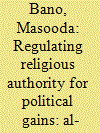| Srl | Item |
| 1 |
ID:
163058


|
|
|
|
|
| Summary/Abstract |
The shedding of blood is a serious matter in Islamic law; disregard for human life negates the very essence of just rule. By standing by General al-Sisi as he suppressed the Muslim Brotherhood, the popular legitimacy of al-Azhar – the oldest seat of Islamic learning – was called into question. This article shows how the al-Sisi government skilfully deployed the two other state-controlled religious establishments, the Ministry of Awqaf (Religious Endowments) and Dar-ul-Ifta, to boost al-Azhar’s popular legitimacy in this context. Existing scholarship highlights the importance of competition within the Egyptian religious sphere to explain how the Egyptian state co-opts the al-Azhari official establishment. This article instead shows how the state, equally skilfully, uses state institutions to boost al-Azhar’s popular legitimacy – albeit to ensure that it remains useful for the purposes of political legitimisation. Political authority and religious authority in Egypt thus remain closely entangled.
|
|
|
|
|
|
|
|
|
|
|
|
|
|
|
|
| 2 |
ID:
163882


|
|
|
|
|
| Summary/Abstract |
Routinely required to lend religious legitimacy to contentious state policies, al-Azhar's moral authority has been under pressure since its nationalization in 1961. This article outlines how Shaykh al-Azhar Ahmad al-Tayyib's recent alliance with President ʿAbd al-Fattah al-Sisi has, however, exposed al-Azhar's moral authority to unprecedented risks. This is for three reasons. First, the tactics used by al-Sisi's government to quell the Muslim Brotherhood have been more extreme than those used by previous regimes. Second, the al-Azhari establishment's defence of these violent tactics has been more unqualified than in the past. Third, current state-led reforms of al-Azhar's curriculum are more controversial than prior efforts along these lines. As I show, these recent developments are not a complete break from the past; rather, they are a natural outcome of incremental shifts that have been occurring within al-Azhar since its nationalization over fifty years ago.
|
|
|
|
|
|
|
|
|
|
|
|
|
|
|
|